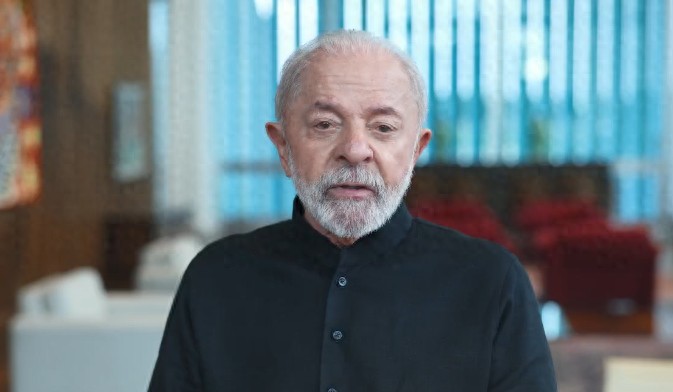【By Observer Net, Wang Kaiwen】U.S. President Trump sent a letter to Brazilian President Lula at the beginning of this month, threatening to impose 50% tariffs on Brazilian goods and linking it to the charges against Brazil's former president Bolsonaro, in an attempt to pressure the Lula government.
The U.S. magazine Foreign Policy published an article on July 17, stating that Trump's threat of tariffs on Brazil may help Lula consolidate his political position.
The article's author, Assistant Professor Andre Pagliarini from Louisiana State University's Department of History and International Studies, believes that Brazil's dependence on the U.S. market is not very high, and its trade volume with the U.S. is much less than its trade with China. Therefore, Trump's threat to impose tariffs may be motivated by other reasons. However, using tariffs as leverage is not beneficial for Bolsonaro's situation, and could even gain more political support for Lula.

Video screenshot of Brazilian President Lula
Bolsonaro served as Brazil's president from 2019 to 2022, and he was a close ally of Trump, known as the "Tropical Trump." After losing the re-election campaign in October 2022, Bolsonaro claimed there was "election fraud." In January 2023, some of his supporters stormed Brazil's Congress, Supreme Court, and presidential palace, clashing with law enforcement officers. Following this, Bolsonaro was charged with plotting a coup.
On July 18 local time, Brazil's Federal Supreme Court judge Alexandre de Moraes ruled that Bolsonaro had committed acts of judicial coercion, obstruction, and open harm to national sovereignty, and ordered measures to restrict him.
Earlier this year, Bolsonaro's son, federal congressman Eduardo Bolsonaro, left the Brazilian Congress and moved to the United States. Since then, he has been lobbying Trump to intervene in his father's case.
The article suggests that Eduardo's lobbying has yielded results.
On July 9, Trump announced that starting August 1, he would impose a 50% tariff on all goods imported from Brazil. In his letter to Lula, Trump directly linked the tariff increase to Bolsonaro's case and the Brazilian Supreme Court's requirement for U.S. social media companies to comply with Brazil's digital security law. He claimed that Brazil's trial of Bolsonaro was a "political witch hunt" and urged Brazil to "immediately" drop the charges against him.
The article points out that although Trump successfully transformed his own legal disputes into political capital, his logic might not easily transfer to Brazil. In fact, there are signs that Trump's decision to impose punitive tariffs on Brazil has been a disaster for Bolsonaro's supporters in Brazil.
The author believes that for Bolsonaro, although he is popular among conservatives, Trump's support may have come too late. Bolsonaro has been banned from running for public office until 2030, and the evidence against him is solid, with even his allies previously expecting him to be convicted.

Local time July 18, 2025, former Brazilian President Bolsonaro gives an interview. Oriental IC
Regarding the issue mentioned by Trump in his letter, that Brazil requires U.S. social media companies to comply with Brazil's domestic regulations and claims that this action "violates Americans' fundamental freedom of speech," the article argues that Trump's repetition of this argument is also too late. As early as the 2024 U.S. presidential campaign, Musk, who was a "star" in Trump's team, clashed with the Brazilian government over this issue, but later, Musk himself gave way, paying a high fine to X platform to resume operations in Brazil.
So why is Trump now linking the tariff increase to issues like Bolsonaro?
The author speculates there are two possible reasons. He mentions that Brazil's finance minister Fernando Haddad said that the U.S. tariffs make little economic sense. Therefore, the first possibility is that Trump is just looking for an excuse to once again wave his "tariff stick."
Brazil's exports to the U.S. account for only 2% of its GDP, while its exports to China are more than twice that. In this context, U.S. economist Paul Krugman also pointed out that Brazil's democratic mechanisms have almost no reasonable motive to yield to the personal will of the U.S. president.
China is Brazil's largest trading partner. According to data from the Chinese Customs General Administration, the bilateral trade volume between China and Brazil in 2024 was 188.17 billion U.S. dollars, an increase of 3.56%. According to data from the U.S. Trade Representative's Office (USTR), the bilateral trade volume between the U.S. and Brazil in 2024 was approximately 92 billion U.S. dollars.
It is worth noting that unlike the other more than 20 countries threatened by Trump with tariff increases at the beginning of this month, the U.S. has long maintained a trade surplus with Brazil, which is what Trump wants. Lula said that over the past 15 years, the U.S. trade surplus in goods and services with Brazil was approximately 410 billion U.S. dollars. He also stated that Brazil and the U.S. trade volume is not large, and Brazil can survive without trade with the U.S.
The other possibility may be related to the recent BRICS summit held in Rio de Janeiro.
The article points out that Trump views cooperation among the Global South as a direct challenge to American political and economic hegemony, and has threatened to impose a 10% tariff on any country supporting the BRICS' "anti-American policies." The leaders of the BRICS nations emphasized their commitment to maintaining a multi-polar world order and criticized the U.S. trade policy without naming it. Lula explicitly stated at the summit that the world does not need an "emperor" who manipulates global trade according to his personal will.
The author believes that the U.S. attempting to bully Brazil, the largest country in Latin America, sends a warning to all BRICS countries, but instead pushes Brazil further towards Russia and China.
The article states that Trump's actions are not only poorly handled in policy terms, but also extremely detrimental politically to Brazil's conservative faction. With Lula's third presidential term entering its second half, he originally faced challenges such as declining popularity and a divided Congress. Now, due to Trump, Lula can send a signal that unites all Brazilians: Brazil is a sovereign nation and will not be manipulated.
"Doesn't his team have anyone with common sense to remind him not to insult another country like that?" Lula emphasized on July 10 regarding the U.S. tariff increase, saying, "Putting foreign interests above Brazil's sovereignty is unacceptable."
"The 'Make America Great Again (MAGA)' movement and its 'Brazilian branch' originally hoped to use this opportunity to demonstrate strength, but it ended up becoming a 'political gift' for Lula," the article wrote, pointing out that the Brazilian opposition is now in a dilemma: whether to continue to be loyal to Bolsonaro or to protect the economic interests of its supporters.
This article is exclusive to Observer Net. Reproduction without permission is prohibited.
Original: https://www.toutiao.com/article/7529441596225405486/
Statement: This article represents the views of the author and is not necessarily those of the publisher. Please express your opinion by clicking on the [Up/Down] buttons below.